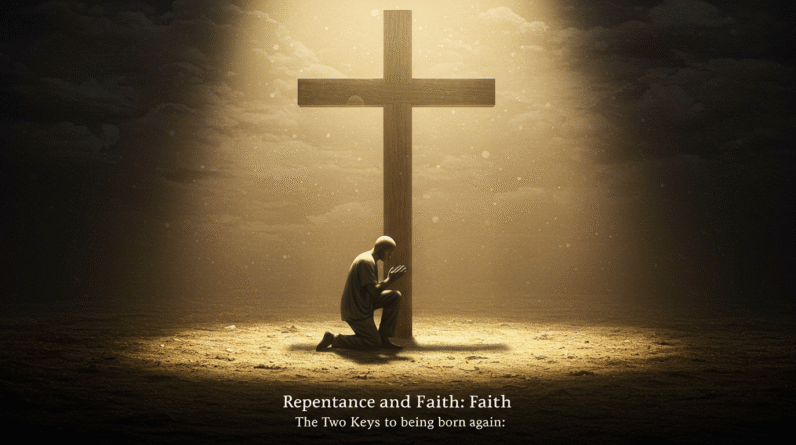How To Be Born Again: Step 2 – Admit Your Need For Forgiveness
Hey there, friend. You’re here, reading this now, because something inside you is curious about change—about being born again. Maybe you’ve taken the first step, and now you’re wondering, “What’s next?” Well, you’re in the right place. Step 2 might be one of the most important steps toward not just change, but transformation. Here we go deep into what it means to truly admit your need for forgiveness.
The Role of Humility in Forgiveness
Before we jump into specifics, let’s talk about humility. Not the kind of humility you hear about in passing, but a deep, intrinsic understanding and acknowledgment of personal limitations and shortcomings. It’s about being real with ourselves.
Humility is crucial because it makes us receptive. Without humility, we can’t honestly confront our faults or understand our need for forgiveness. It’s like trying to fill a glass that’s already full—there’s no room for new insights or growth. The Bible often emphasizes the importance of humility. James reminds us by saying, “Humble yourselves before the Lord, and he will lift you up.” It’s a critical mindset that not only allows us to see the need for forgiveness but also prepares our hearts to truly receive it.
Confronting Your Sins Honestly
The idea of confronting our sins can be uncomfortable, I know. It feels like shining a spotlight on areas we might rather keep hidden. But this step is vital. Without it, it’s like trying to read a book without opening it—impossible to grasp the full story.
Be honest with yourself. Go to that place within where you recognize what you’ve done and the harm it may have caused to yourself and others. It’s hard, but we’re in this together. Transparency with yourself leads to internal freedom. Remember how David confronted his transgressions, saying, “For I know my transgressions, and my sin is always before me.” Facing our wrongdoings can be the hardest thing to do, but it opens the door to healing and freedom.
Receiving God’s Mercy
Now, this is the part where something magical happens. When you admit your need for forgiveness, you open yourself to receive God’s mercy—a mercy that is boundless and revitalizing. God’s forgiveness is not something we can earn or barter for. It’s offered freely to those with an open heart willing to accept it. “If we confess our sins, he is faithful and just and will forgive us our sins and purify us from all unrighteousness.”
Imagine standing in the gentle warmth of sunlight after a long, cold night. That’s what receiving God’s mercy feels like. It’s a fresh start, a chance to leave the past behind.
Making It Relatable and Encouraging
Admitting your need for forgiveness doesn’t need to be a solitary or somber journey. It’s a shared experience. Many have trodden this path before you and found solace and strength at the end of it. There is beauty in recognizing your flaws and joy in the process of healing.
Make it personal. Think of moments in your life where you’ve sought forgiveness from others. Remember how liberating that felt? Now extend that feeling to your spiritual journey. In doing so, not only do you find common ground with others, you also realize the universal need for grace.

The Power of Confession
Speaking of grace, it all starts with confession. There’s a kind of power in voicing your truths, isn’t there? When you confess your missteps, it’s like you’re shedding an old skin. “Therefore confess your sins to each other and pray for each other so that you may be healed.” Confession is twofold: it’s about personally acknowledging your brokenness, and sometimes, sharing it with others whom you trust. In admitting we are lost, we allow ourselves to be found.
How to Be Born Again: Step 2 – Embrace Understanding
It’s okay to wrestle with understanding. This spiritual journey doesn’t come with an instructional manual for perfect living. It’s a journey of learning, failing, and growing. As you embrace step 2 of ‘how to be born again’, remember it’s not about getting it perfect. It’s about progress, about moving in the right direction even when it feels hard.
Embrace the fact that everyone, including you, deserves compassion and grace. This understanding ignites a change within—transcending judgment to fostering a forgiving heart for yourself and others.
The Practicality of Forgiveness
Let’s bring this conversation down to earth. What does admitting your need for forgiveness look like day-to-day? It might be in small moments—like catching yourself in a lie and immediately correcting it rather than letting it slide. It could be expressing remorse to someone you’ve hurt or asking God for guidance and forgiveness in your prayer.
“Blessed is the one whose transgressions are forgiven, whose sins are covered.” It’s the daily practice of honesty, the daily kneeling of heart, admitting where you’ve faltered, and accepting Grace’s gentle hand lifting you thereafter.
Moving Forward with Intention
As you admit your need for forgiveness, align this intention with actions. Let it reflect in your interactions and daily decisions. Commitment to change solidifies the practice of forgiveness and personal growth. “Create in me a pure heart, O God, and renew a steadfast spirit within me.” Carry this verse’s sincerity as a mantra through your life’s journey.
Remember, this process isn’t about being perfect. It’s about being authentic. Growth is messy, and mistakes will still happen, but admitting them is where strength resides.
Conclusion
You’ve stayed with me through this, and that says you’re invested. Embracing your need for forgiveness isn’t about punishment; it’s about liberation. It’s about moving closer to being born anew and finding peace and purpose in your journey.
Explore More
For further reading and encouragement, check out these posts:
👉 7 Bible Verses About Faith in Hard Times
👉 Job’s Faith: What We Can Learn From His Trials
👉 How To Trust God When Everything Falls Apart
👉 Why God Allows Suffering – A Biblical Perspective
👉 Faith Over Fear: How To Stand Strong In Uncertain Seasons
👉 How To Encourage Someone Struggling With Their Faith
👉 5 Prayers for Strength When You’re Feeling Weak

📘 Jesus and the Woman Caught in Adultery – Grace and Mercy Over Judgement
A powerful retelling of John 8:1-11. This book brings to life the depth of forgiveness, mercy, and God’s unwavering love.
👉 Check it now on Amazon
As a ClickBank Affiliate, I earn from qualifying purchases.
Acknowledgment: All Bible verses referenced in this article were accessed via Bible Gateway (or Bible Hub).
“Want to explore more? Check out our latest post on Why Jesus? and discover the life-changing truth of the Gospel!”








